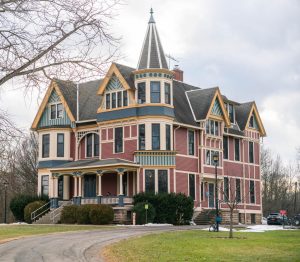Arthur L. Day Award Recipient to Give Lecture at Oberlin
November 15, 2013
Every three years, the National Academy of Sciences selects a recipient of the Arthur L. Day Prize who has exhibited excellence in scientific pursuits and made a durable contribution to the study of earth physics. This year’s recipient, Dr. Lawrence Edwards, was invited to give a series of talks, one yesterday, another today, and Thursday Nov. 21, in Craig Lecture Hall.
Edwards admitted in an interview that his selection for prize caught him by surprise.
“I didn’t even realize I was in the running. I was completely shocked,” Edward said.
Dr. Edwards, a geology professor at the University of Minnesota, selected Oberlin for these talks largely because of his personal connection to the College. “My mom worked for Oberlin in China; she worked for the Shansi program. I’ve had a few relatives go to Oberlin. My daughter is currently a sophomore there,” Edwards said.
Efforts to bring Edwards here began last year when Edwards initiated contact with Associate Professor and former chair of the Geology department Karla Hubbard, who put him in touch with Professor and current chair of the Geology department Dennis Hubbard. Former Dean of the Oberlin College of Arts and Sciences, Sean Decatur, as well as Geology department Administrative Assistant Pat Sturges, were also instrumental in helping to bring Edwards to campus.
Edwards’s primary research focuses on ice ages and how they come about. He has also concentrated on the necessary steps to reduce carbon emissions globally, which he realizes is a very long and tedious process.
“Well. [the talks are] mainly to communicate some ideas about climate change. We’re looking back hundreds of thousands of years, which isn’t very much geologically, but when you look at these large slots of time, you really get some perspective on what’s happened for climate change in the past,” Edwards said.
“How fast can you get really rapid climate change, and when you do does it affect a large portion of the globe or just a portion of the globe? But you see these variations; there are times when the mean variation of temperature in Cleveland changed 15 degrees centigrade in a decade.”
According to an email from Sturges, Edwards’s research also addresses limestone and cave deposits.
“Modern data show quite clearly that the climate is changing, and there is broad scientific consensus that human activities are responsible for much of the change that is happening right now. A tricky thi/ng about this kind of work is that we know that over geologic time, the Earth’s climate has changed quite a bit without human help, and we need to establish a baseline of natural change to understand our part in the current climate predicament. Larry’s work allows us to precisely determine the age of thinly layered limestone found in cave deposits back 700,000 years.”
Although Edwards has conducted extensive research, he still claims that he expects to learn from Oberlin students. When asked how he felt about Oberlin’s commitment to environmental sustainability Edwards replied, “That’s fantastic, the concept, but I actually was just thinking about that. I’m going to have all sorts of questions about [that]; the idea is just absolutely fantastic. I’ll be very interested in hearing what they are doing, but we also need to get things going on a larger scale, so a top-down and bottom-up effect.”
Edwards hopes that his recent recognition will eventually help him inspire real change.
“What we’ve got to do is something similar in magnitude to the industrial revolution, but we’ve got to get everyone in the world onboard,” Edwards commented.
Regarding his hopes for the future of the climate change movement, Edwards concluded by saying, “We need to start on a good [carbon reduction] plan now. We’ve got decades [of] more business [to do].”
























